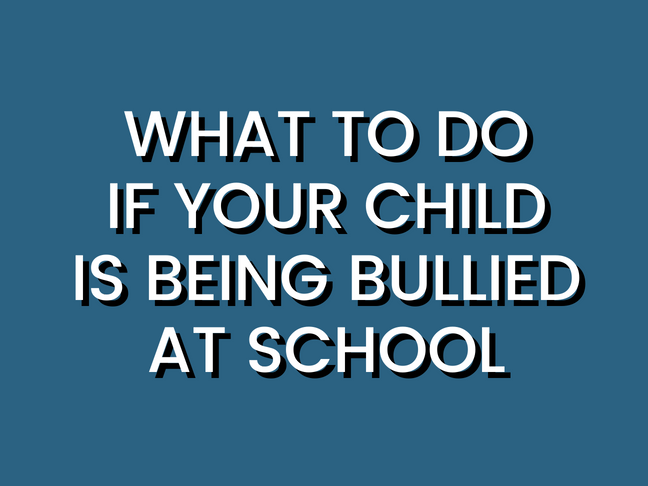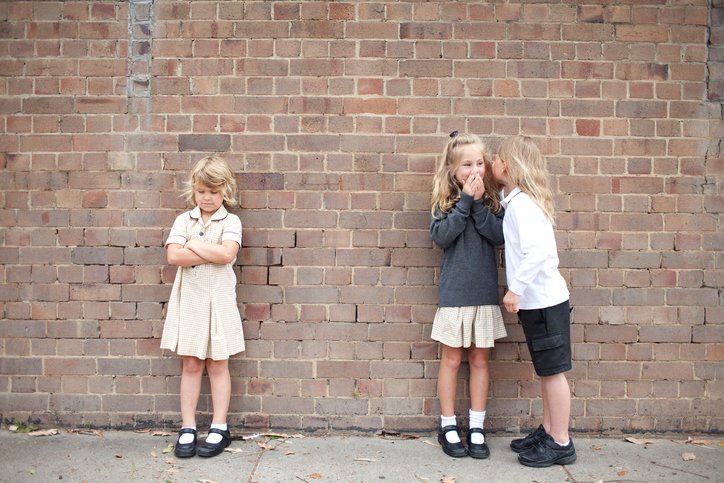Now that it’s nearly time to go back to school, it’s important to have a plan of action ready to go if you suspect your child is being bullied. Every kid eventually gets picked on at some point. School-aged children go through a lot of physical growth, social adjustments, emotional growth, mental development, and hormonal explosions in a pretty short period of time, so it’s natural to test boundaries and lash out at those who are around them the most: classmates. Whether it’s a brush with meanness or straight-up bullying, it will happen.
There are things we can do to lessen the blow, like raise our kids with good self-confidence, encourage strong bonds between siblings who will look out for one another’s back, and talk them through potential scenarios. But even with all of this, we will need to choose when to get involved when our kids get picked on—and how involved to get.
Both of my kids have been treated poorly by peers at school or at extracurricular activities over the years. Each scenario was completely different, teaching me that there is no one solution for things that happen to them under the wide, wide umbrella of bullying. That being said, there are steps I found myself following that helped me decide how serious each situation was, whether or not my kids could handle it on their own, and when it was time to get the school involved.

Whether they told me it happened, I overheard it, or I saw it with my own eyes, I made a point to get more information about the situation. This worked best when I shut my question-filled interrogation hole. Well, first I’d ask for the full story, then I’d zip my lip. My kids would fill that silence with words and body language, which I’d write down in case I needed it again later.
Once I got their full story, I’d remember to put mental quote marks around the words “full story.” Their feelings were always real—which would tug at my heartstrings, of course—but I only heard their perspective. This small corner of the big picture wasn’t enough for me to start on a warpath. Did I have empathy for them? Absolutely. Did I agree that the kid who hurt their feelings automatically deserved a butt kicking? Nope.
I found it more fruitful to be a calm, safe place for my kids to land than a fired-up mama bear growling about tearing the school apart. The kid on the other side of the story likely had their own tale to tell, too. I have enough empathy for all (or would at least allow some for the perpetrator until proven otherwise).
Next, I’d ask a very important question: Did you just want to get this off your chest, or did you tell me because you want advice or other help from me? Then I’d respect their answer (unless it was to do nothing when someone was clearly in danger). In some cases, my kids felt like a boiling pot that needed to release the steam.
The simple act of taking off their lid and venting to me was enough for them to let it go and move on. They understood that kids make mistakes. Many other times, they wanted advice on how to handle it themselves, because it felt a little more personal. We’d both throw out some ideas until we came to a plan of action they felt comfortable with.
I like information, so I did some reading up on definitions and policies about bullying in both their school handbooks and the local police’s website. This often helped guide my decision on how to handle things on my end if I either wasn’t sure how “bad” the situation was, or if my kids and I thought maybe we needed to talk to someone at the school about what happened.
Understanding school procedure also helped me communicate with the faculty in a more effective manner when the situation was serious enough to require it. I knew who to reach out to, what they needed from me, and how or what to request to get assistance in figuring out what was going on—which was always done in writing. My details were clear, my questions concise, and I let them know my expectations as the parent of the kid who was the target of the behavior. Then I’d send it on its way and stay on top of its progress until it was resolved.
It didn’t matter whether what happened was a one-time mistake by a peer or behavior that concerned me enough that I wanted to report it in writing to the administration, in every situation I made absolutely sure to follow up with my kid. I took their feelings about it seriously, checking in to see how they were doing. Once they got to the point they’d roll their eyes at me like I was crazy for still bringing it up, that was the signal it was time for me to let it go, too.
Seeing that the school had policies in place and was willing to listen to them about these concerns has made my kids feel like they aren’t alone when on school grounds. Knowing that I have their backs and validate their concerns, big or small, has made my kids more willing to come to me when they have them. Keeping them in the loop during the process has also taught them about their rights, shown them conflict resolution tactics, and even given them the confidence to stand up for themselves and others when these kinds of situations come up.
With cool heads and open communication, we’ve managed to make the experience of getting bullied a little less awful, for my kids know that their voices will be heard and there is always a way to move past it in the most positive way possible.








